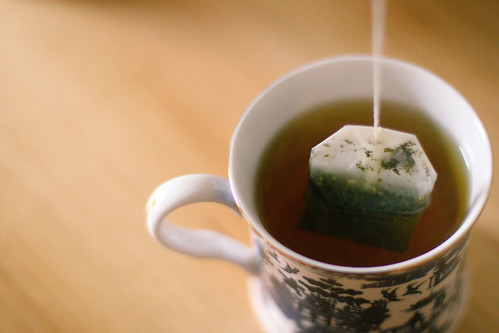Abdominal bloating is a condition in which the stomach feels full and tight due to buildup of gas in the small intestine. This can make the stomach area visibly swollen. Many times, bloating is accompanied by other symptoms like cramps, belching, pain, diarrhea, shortness of breath and lower back pain.
A number of factors can cause bloating. The main reason is the buildup of intestinal gas. Other causes include constipation, peptic ulcers, anorexia, anxiety, smoking, water retention, trapped air, overeating, indigestion, premenstrual syndrome (PMS), menopause, and irritable bowel syndrome (IBS).
A good way to relieve bloating is to encourage passing gas and a bowel movement. But if you are not able to get rid of bloating, then try some simple home remedies.
Here are the top 10 ways to get rid of abdominal bloating.
1. Fennel Seeds
Fennel seeds are very effective for digestive problems like bloating due to their carminative, diuretic, pain-reducing and anti-microbial properties. Fennel seeds help relieve bloating by relaxing muscle spasms in the digestive tract.
- Chew on a few fennel seeds after eating a big meal.
- Add one teaspoon of fennel seeds to 1 cup of hot water. Cover and allow it to steep for 5 to 10 minutes. Strain it. Have this tea two or three times a day.
2. Peppermint
Peppermint contains menthol oil, which has an anti-spasmodic effect on the smooth muscle of the digestive tract. This helps relieve spasms in the gastrointestinal tract, bile duct and gallbladder.
It also calms flatulence and helps food pass through the stomach quickly.
- You can chew on fresh peppermint leaves for relief from bloating.
- Another option is to steep a peppermint tea bag in hot water for about 10 minutes and drink two to three cups of this tea a day.
3. Ginger
Ginger is a well-known herb that can be used to reduce gas and bloating. It contains several active ingredients, including the pungent compounds gingerols and shogaols that help reduce inflammation in the intestines and relax the intestinal muscles.
- Place five to six thin slices of ginger in a cup and pour boiling water into the cup. Cover the cup and let it steep for about 10 minutes. Add a little honey and lemon juice to it and then drink it up to three times a day.
- Another option is to eat one teaspoon of fresh grated ginger before meals. You can also grate ginger root and sprinkle it on your food.
- Adults can opt to take 0.25 to 1 g of powdered ginger root daily.
4. Chamomile Tea
Chamomile tea is another effective option to get relief from bloating. This herbal tea has anti-inflammatory and anti-spasmodic properties that can help soothe the stomach and help with heartburn as well.
- Bring one cup of water to a boil. Pour it into a cup containing one chamomile tea bag. Cover and let it steep for 10 minutes.
- Squeeze out the tea bag and add some lemon juice or honey as desired.
- Sip the tea slowly. Have this tea two or three times a day between meals.
5. Caraway Seeds
Caraway has anti-spasmodic effects as well as antimicrobial and carminative properties. Two chemicals present in caraway seeds, carvol and carvene, help soothe the smooth muscle tissues of the digestive tract and promote expulsion of gas to give you instant relief from stomach bloating.
- If you suffer from frequent bloating, chew a pinch of caraway seeds several times throughout the day.
- If the taste of raw caraway seeds is too strong for you, try some caraway crackers.
- Alternatively, you can brew crushed caraway seeds to make a tea.
6. Pumpkin
Eating pumpkin is an excellent way to prevent unwanted flatulence as well as bloating. Pumpkin contains a good amount of vitamin A, potassium and fiber that help in digestion.
Adding just one cup of pumpkin to your meals can help create a smooth digestive flow and reduce gas. You can steam, bake or broil it, or include it as an ingredient in your recipes.
7. Anise
Anise contains anti-spasmodic properties that can help relax your digestive tract. Also, it has carminative properties to help expel gas buildup in your digestive tract and reduce bloating. The best way to obtain the beneficial effects of this herb is by drinking anise tea.
Note: The U.S. Food & Drug Administration warns that giving infants tea made with anise can result in seizures, vomiting, restlessness and rapid eye movement. Also, pregnant women should not consume anise.
8. Activated Charcoal
Activated charcoal has porous properties, which means it has holes that allow the passing of air and water. These spaces can trap excess gas in the intestines caused by stomach bacteria.
Activated charcoal is available in tablet, capsule and powder form. Seek medical advice to learn the exact dosage that is right for you.
9. Bananas
A good source of fiber, bananas can help reduce bloating and gas associated with constipation. Also bananas contain potassium, a mineral that helps regulate fluid levels in your body and gives relief from bloating.
If you eat bananas regularly, you can eliminate bloating. You can eat them as a snack or add them to fruit salads and baked desserts.
10. Warm Lemon Water
Drinking warm water is good for health as it helps remove harmful toxins from the body as well as keeps the body hydrated. Lemons are rich in vitamins B and C, riboflavin, calcium, phosphorus, magnesium, proteins and carbohydrates that help in digestion.
Also, the acidic property of lemons stimulates the production of hydrochloric acid, which helps break down food.
When water and lemon are mixed together, it can be highly beneficial for your digestive system. Drinking warm lemon water can give you relief from bloating, gas and constipation.
Bloating can affect your daily activities, but with these remedies you can keep your stomach happy. However, if the condition is chronic, it may require medication and a change in diet and lifestyle to resolve. Consult your doctor if this is the case.
Source
http://www.top10homeremedies.com/how-to/get-rid-bloating.html
Resources:






No comments:
Post a Comment